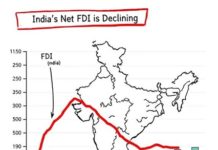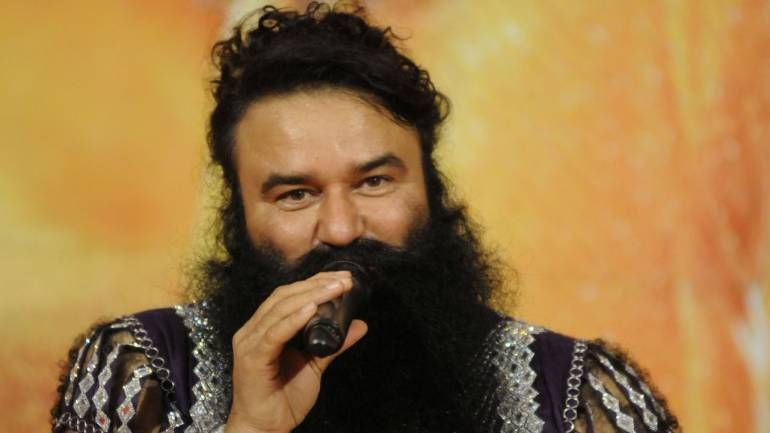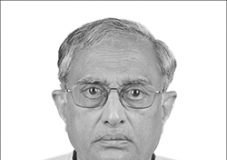Source: http://www.moneycontrol.com/news/trends/current-affairs-trends/it-is-governments-that-fetter-organised-hinduism-and-give-rise-to-ram-rahims-2375693.html
What makes a Ram Rahim prosper and thrive in India?
Mainstream religious groups get emasculated by the government of their administrative and financial, which creates a vacuum immediately filled by quasi-religious leaders having large numbers of followers and huge pots of tax-free money.
R.N.Bhaskar – Sep 01, 2017 04:56 PM IST
 The senior members of Dera Sacha Sauda (headed by Gurmeet Singh aka Baba Ram Rahim Insaan) are engaged in selecting the next head of a vast organisation that the imprisoned leader has left behind. As things stand now, the choice appears to be tilting towards his son. There appears to be no other contender for this post – at least till now.
The senior members of Dera Sacha Sauda (headed by Gurmeet Singh aka Baba Ram Rahim Insaan) are engaged in selecting the next head of a vast organisation that the imprisoned leader has left behind. As things stand now, the choice appears to be tilting towards his son. There appears to be no other contender for this post – at least till now.
But hold it there. Isn’t there enough evidence of mismanagement, of attempting to create a private army, of attempting to intimidate, coerce, and even kill people who objected to what the head of the Dera stood for?
When organisations are guilty of gross mismanagement, hasn’t the government always claimed that it has the right and even the moral obligation to take over management of such organisations? This is what is done under the Companies Act. This is done for Section 25 companies as well. It is also done for other not-for-profit organisations, including temple trusts. So why is the government shying away from taking over the management of all properties and activities of Dera Sacha Sauda (DSS)?
Something stinks, right? Of course, it does. For any Dera to succeed, it needs to have the blessings of the government in two ways.
The second thing that an organisation like DSS requires is tax exemption if it wants to grow. This requires a clearance from the income tax authorities. Normally, the tax authorities are loath to grant tax exemptions to organisations. In fact, this author (who is the secretary of the Society for the Right to Die with Dignity) was told rather sanctimoniously by the tax authorities that it could not give tax exemptions to such a cause – which the Supreme Court has now recognized as part of the right to privacy. But when a person is well-connected politically, the self-righteousness is replaced by obsequiousness.
The combination of political connections (which leads to political largesse) and tax exemptions allow such organisations to grow quickly. The climb becomes easier if the head also has the gift of the (intelligent) gab and the ability to pose as a spiritually ordained leader. The list is endless. Each one of them has political connections. Each one of them has the power of persuasion. They would not have grown so big so soon had it not been for the political largesse of free land (http://www.asiaconverge.com/2016/04/sri-sri-baba-ramdev-hinduism-produce-godmen-faiths/) and the benefit of tax exemptions as well.
But the biggest advantage such a leader has is the government’s capricious way of smothering legitimate mainstream religious leaders. Take the head of the Kanchi Math, for instance. He may be the spiritual head of a major religious order. But his financial powers are zilch. His finances are controlled by a government appointed administrator. This is because the government has — through various clones of the infamous ‘legal’ Hindu Religious and Charitable Endowment (HR&CE) Act of 1951 — allowed itself to take over the financial and administrative affairs of one temple trust after another.
Thus the actual leaders of the most venerated mainstream religious groups stand emasculated. They hold the titular position of leader. But they are without the financial and administrative powers over their own trusts and land holdings. This creates a vacuum which is immediately filled by quasi-religious leaders. The trusts of these quasi-religious leaders are not administered by the government. They get more free land entitlements each year than do the trusts of Udupi, or Tirumala (which run the Tirupati temple and education complex). Everyone knows that some of these lands are used for commercial reasons. Business enterprises and factories are run on them. But nobody asks questions. They enjoy political clout. And now they have the clout of both money and a politically relevant large number of followers.
The government’s interest in owning temples (not mosques, churches, gurudwaras and other minority institutions as they enjoy constitutional protection as minority institutions) is because they control huge wealth. The gold in the Padmanabha temple is legendary. The annual collections by the Tirumala Trusts or Shirdi, or Siddhi Vinayak are huge.
It’s worth noting that Gurmeet Singh prospered in Hindu Haryana and not Sikh-majority Punjab. In other words, it was in a region that mainstream religion had been emasculated that an entrepreneur guru could hold sway.
By taking control of such funds, politicians achieve two objectives. First, they can now direct the funds to politically relevant causes. Second, they ensure that the weakened religious leaders create a vacuum in which new religious leaders can grow unchallenged. Thus, the government’s penchant to control the legitimate has encouraged the emergence of the less legitimate, and even the illegitimate.
The Supreme Court has tried (http://www.asiaconverge.com/2016/04/courting-god-the-supreme-court-attempts-to-rescue-indias-temples/)to liberate temples from the government. When the Tamil Nadu government tried to take over one of the last staunchly independent Chidambaram temple trusts, the trustees waged a valiant battle. It finally ended with a Supreme Court verdict on January 6, 2014, which laid down two cardinal principles. First, the government has the right to take over mismanaged trusts, but has an obligation to set a time limit by when the wrongs can be righted. There can be no takeover in perpetuity, stated the apex court. Second, the temple funds are for the devotees and followers of the temple trust, even if they number one or two. Those funds are not for the government. The Chidambaram trusts were spared. It was hoped that other temple trusts would also seek protection under the umbrella of this verdict. But since the appeal has to be made by the temple administration and trustees, and since the trustees of most big temples are government appointed, none has dared become independent of the government.
The Chidambaram trusts were spared. It was hoped that other temple trusts would also seek protection under the umbrella of this verdict. But since the appeal has to be made by the temple administration and trustees, and since the trustees of most big temples are government appointed, none has dared become independent of the government.
Not that all gurus are bad. Not at all. But they grow more easily in the vacuum created by the government. The field is left open by the established leaders becoming weakened by government-appointed temple administrators. The mainstream Hindu spiritual leaders remain without financial and administrative powers of their own temple trusts. It is in such a vacated space that a Nirankari Trust becomes immensely relevant. It offers blood tests to common people at Rs 5 per test or X-rays at Rs 25. It has a very large following because the trust offers critically needed services at reasonable charges.
This is something that the government should have offered. But in the vacuum created by the government (through its own dereliction of duty), such trusts gain relevance. From relevance comes faith and trust, and such sentiments give rise to a large following. Politicians then use these gurus for creating captive vote banks.
Take one of the most relevant spiritual organisations – the gurudwaras of the Sikhs. Nobody is sent home hungry if he is willing to do social service. The langars provide food, but to people who are willing to clean the floors, wash clothes, polish footwear, clean vessels and so on. You don’t see a single Sikh beggar on the streets. If there is one spiritual organisation that has uplifted its people, it is the gurudwara. But that is what the government should have also done. Thus, when someone points to mismanagement of funds in some gurudwaras, the accusation is laughable. Yes, they may be mismanaged. But they are less mismanaged than the government which has abdicated its responsibility of allowing its mainstream community the right to govern itself.
When the mainstream spiritual heads lose their clout, clones erupt everywhere. Some of them are rapists, murderers, swindlers and worse. But they survive because they have the political backing which is reinforced by having a large numbers of followers and huge pots of tax-free money.










































COMMENTS